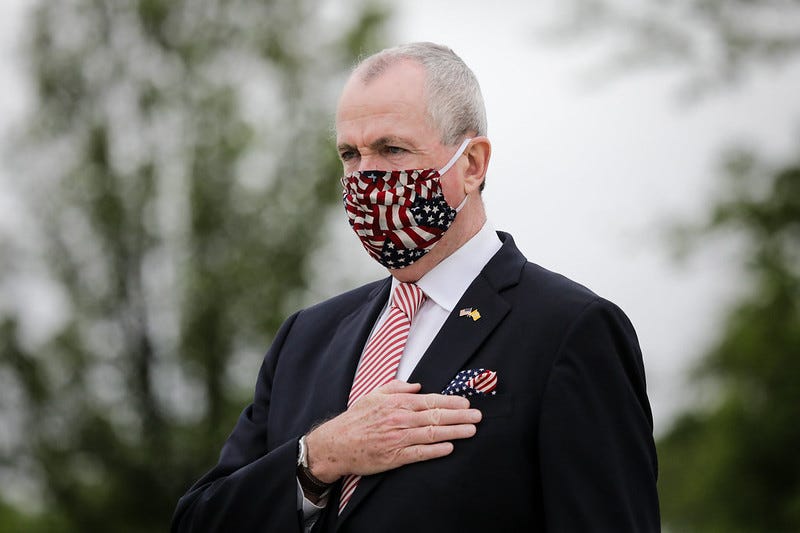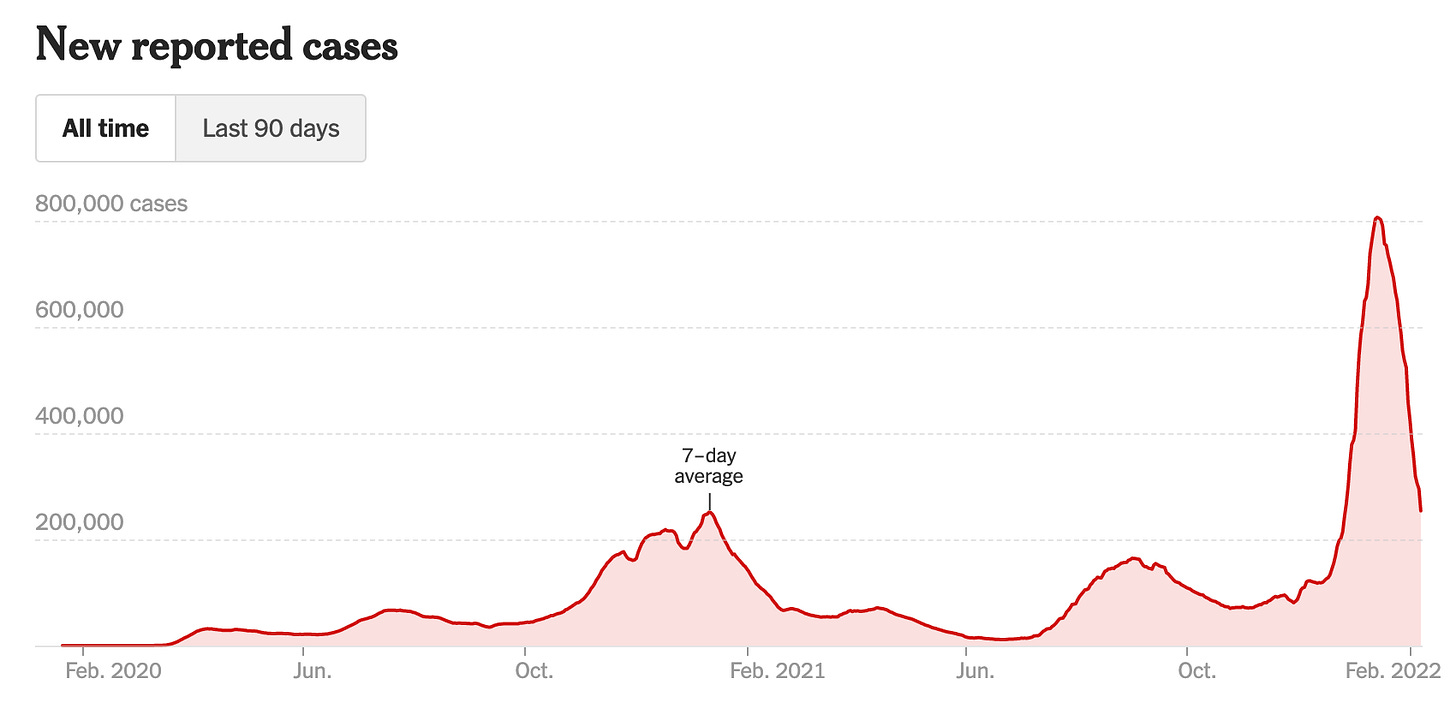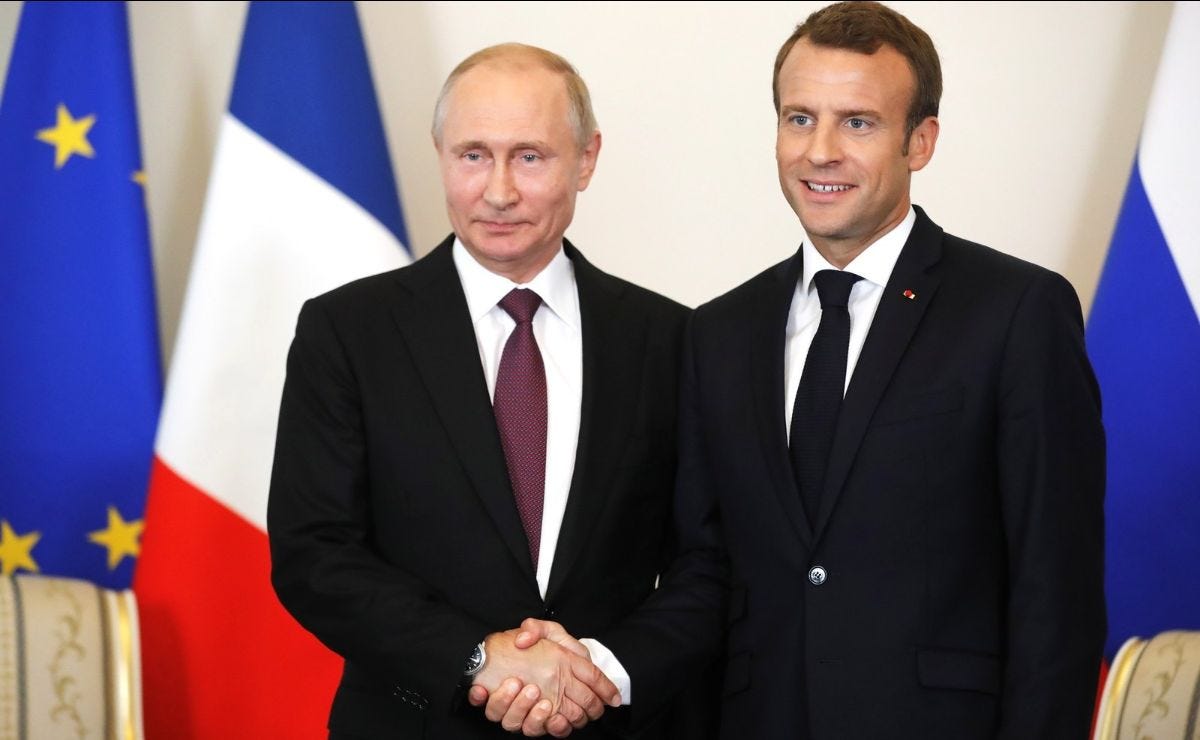Wake Up To Politics - February 9, 2022
Wake Up To Politics: Is the “return to normal” here?
by Gabe Fleisher
Good morning! It’s Wednesday, February 9, 2022. Election Day 2022 is 272 days away. Election Day 2024 is 1,000 days away.
Is the “return to normal” here?
Two more Democratic governors will announce today that they are dropping their Covid-era indoor mask mandates.
In New York, Gov. Kathy Hochul will put an end to a requirement for businesses to either require masks or check vaccinations, while Gov. J.B. Pritzker in Illinois will lay out a timeline to phase out his mandate for mask-wearing in most indoor settings.
They are the latest in a series of blue-state governors who are agitating for a “return to normal” as the Omicron surge fades. The dam began to break on Monday, after New Jersey Gov. Phil Murphy announced plans to lift his mask mandate for schools and day care facilities by mid-March.
In quick succession, the governors of California, Connecticut, Delaware, and Oregon followed suit — all announcing forthcoming dates when their mask mandates either for schools or for all residents would be eliminated.

A wave of recent polls suggest that Americans are behind them. As the New York Times reported on Tuesday, a string of new polls have all come up with the same result: a growing segment of the country is frustrated with lasting Covid restrictions, and ready for the “return to normal.”
In a Monmouth survey released last week, for example, 70% of Americans said they agreed with the statement that “it’s time we accept that Covid is here to stay and we just need to get on with our lives.”
According to the poll, the sentiment is loudest among Republicans and Independents; indeed, many Republican governors eased their state Covid restrictions earlier in the pandemic. More recently, Virginia Gov. Glenn Youngkin ended his state’s mask mandate for schools upon taking office last month, presaging the wave of Democrats who have joined him this week.
In the last few days, many public health experts have sent signals that the time for such a switch has arrived. “Throughout the pandemic, there were two camps: one that opposed restrictions and one that supported them,” Dr. Leana Wen, the former Baltimore health commissioner and George Washington University public health professor, wrote in a Washington Post op-ed published Tuesday.
But, Wen added, a third camp has now emerged: one that once supported restrictions “but now believes circumstances have changed enough that mandates can go” and priorities can shift. “Policymakers would do well to heed this group as we enter the next phase of the pandemic,” Wen concluded.
So, what changed that has brought about this sudden switch? For one thing, Covid cases are plummeting across the U.S., down in 49 of the 50 states (Maine is the sole exception). Nationwide, per the Times dashboard, there has been a 64% decrease in new infections over the past two weeks.
That still means about 250,000 Americans are testing positive each day, which means the U.S. is still sicker at the tail end of Omicron than at the height of previous surges. In fact, according to the Wall Street Journal, there is likely more people sick right now across the globe than at any point since the 1918-1919 flu pandemic.
But the Covid toolbox, at least in the U.S., has also expanded relative to previous surges: three doses of the Covid vaccines have been found to be 90% effective at preventing hospitalization from Omicron, while a new Covid antiviral pill from Pfizer reduces the risk of hospitalization or death by 89% in its recipients. (It should be noted that uptake of the Covid boosters remains low, and the antivirals remain difficult to find.)
By one estimate, Omicron will also have infected about 40% of the U.S. population by mid-February (many with mild or asymptomatic cases), a dazzling amount of sickness but a sign that more Americans will gain at least some level of immunity from the virus — making the end of the current surge a perfect off-ramp for easing restrictions, in the eyes of many experts and now governors.
The Biden administration, however, has yet to embrace the viewpoint of its state-level counterparts. “Now is not the moment” to end school mask mandates, CDC Director Rochelle Walensky told Reuters on Tuesday, affirming that the federal government has no plans to change its mask guidance even as a growing number of governors buck against it.
Walensky pointed to reports that many hospitals continue to be “overwhelmed” by Covid cases in urging Americans to continue to mask up indoors. The White House is also reportedly nervous to make a major messaging switch about the end of the Omicron surge, having previously “declared independence” from the virus in July only to see new variants emerge.
But a chorus of Democratic strategists and politicians have urged Biden to at least signal some movement for the country, possibly at his State of the Union address on March 1, in a bid to ignite optimism, rebuild his approval ratings, and also grow his party’s chances in the midterm elections — which many pols believe will be tied to the state of Covid.
If Biden does adopt a new Covid tone — and a new mindset for the country about a “return to normal,” minimizing the virus but not stamping it out — watch for him to emulate the Democratic governors who began seeding the ground this week.
“We are not going to manage Covid to zero,” Gov. Murphy of New Jersey wrote on Twitter when he announced his plan to ease restrictions. “We have to learn how to live with Covid as we move from a pandemic to an endemic phase of this virus.”
On the topic of Covid, here are a few pieces that have made me think lately:
The Atlantic asks: What does “endemic” mean, anyways?
Ezra Klein asks: Was America’s Covid response a breakdown in policy, or a result of crumbling societal trust?
Lawmakers ask: Is it time for a 9/11-style commission to probe the Covid response and gear up for future pandemics?
Financial Times asks: Where is the universal coronavirus vaccine?
Blake Murdoch asks: Are we missing the one mitigation measure that could be most effective against Covid and other airborne pathogens?
Each morning, WUTP’s team of contributors rotate to offer a briefing on the latest news in a different policy area. It’s Wednesday, so Miles Hession is here with the week’s top global headlines:
First, the latest updates on the situation in Ukraine:
-- A meeting between French President Emmanuel Macron and Russian President Vladimir Putin on Monday resulted in more mixed messaging. Macron left saying Putin promised not to further escalate in Ukraine, which the Kremlin swiftly denied. French officials also began floating the idea of Ukrainian “Finlandization,” establishing a sort of neutrality for the country, which Macron then swiftly denied.
-- The Putin/Macron huddle does point to a potential diplomatic path ahead, as the French leaders seems more willing than others in Europe to make significant concessions to Russia.
-- President Biden declared that the U.S. and Germany are “in lockstep,” despite German Chancellor Olaf Scholz refusing to explicitly support the end of the Nord Stream 2 pipeline should Russia invade.
-- Chinese President Xi Jinping threw his support behind Putin in a new pact between China and Russia, declaring “no ‘forbidden areas’ of cooperation.”
-- U.S. troops have been deployed in Eastern Europe to reinforce NATO allies on Russia’s Eastern border amid rising tensions. Russia likewise has begun deploying troops to neighboring Belarus.
Next, let’s move over to Canada for an update on the trucker protests there:
Protestors involved in the Canadian trucker protest have upped their demands as the movement gained traction internationally. What started as a more focused convoy to repeal a vaccine mandate for truck drivers crossing the border between the U.S.-Canada has evolved into a wider push to completely repeal pandemic restrictions in Canada. In Ottawa, where the protests first emerged, the police have begun a harsher crackdown but have been overwhelmed by the size, and financing, of the movement.
Prime Minister Justin Truedau has repeatedly called for an end to the protests as protestors have begun to blockade the border, but has been reluctant to respond with more force. The movement has struck a chord with many Canadians, and has drawn support from the far-right, with some supporters pictured wearing Nazi symbols and others being known far-right figures.
The movement’s effects have spread far beyond Canada and have received international attention. In New Zealand and Australia, two countries with some of the most stringent coronavirus restrictions, protests have gained traction in direct solidarity with those in Canada. Donald Trump and Florida Governor Ron Desantis have also voiced their support for the protestors, much to the chagrin of Canadian politicians, with Desantis decrying crowdfunding platform GoFundMe’s decision to refund donations made in support for the movement.
The trucker protest has quickly become a powerful image and rallying cry for the far-right and others who are anti-restrictions. With the moderate Canadian Conservative party leader Erin O’Toole ousted earlier this week, it’s likely the far-right’s presence in Canadian politics will grow in that vacuum.
And here are a few more global stories to watch:
Talks between Iran and the U.S. resumed this week to salvage the Iran nuclear deal with some momentum, but Republicans vowed to thwart the plan.
President Umarro Embaló of Guinea-Bisseau declared the government was under control after an attempted coup, the seventh coup attempt in Africa in the past 18 months.
Amid growing calls for a no-confidence vote, British Prime Minister Boris Johnson has carried out a Cabinet reshuffle.
Retired Pope Benedict XVI asked for forgiveness, but admitted no wrongdoing, over handling of child abuse cases as scrutiny over the Catholic Church’s response to these cases increases.
All times Eastern.
President Joe Biden will receive his daily intelligence briefing at 9:30 a.m. Later, at 2:30 p.m., he will participate in a roundtable with CEOs of electric utilities to discuss his “Build Back Better” agenda.
First Lady Jill Biden and Health and Human Services Secretary Xavier Becerra will travel to Minneapolis, Minnesota. At 1:30 p.m., they will arrive at the Minneapolis airport, where they will greet with frontline health care workers and deliver care packages for soldiers. At 2 p.m., they will hold a listening session at the University of Minnesota on child care.
White House press secretary Jen Psaki will hold her daily press briefing at 12:30 p.m.
U.S. public health officials will hold a press briefing at 11 a.m. to provide an update on the Covid-19 response. Participants will include Dr. Anthony Fauci, the White House chief medical adviser; Dr. Rochelle Walensky, the CDC director; and Jeff Zients, the White House Covid-19 response coordinator. The Senate will convene at 10 a.m. and resume consideration of several Biden nominees. At around 11:30 a.m., the chamber will hold a confirmation vote on Scott Nathan’s nomination to be CEO of the U.S. International Development Finance Corporation.
After the Nathan vote, the Senate will hold a cloture vote to advance Douglas Bush’s nomination to be Assistant Secretary of the Army for Acquisition, Logistics, and Technology. At around 2:15 p.m., the chamber will vote on Bush’s confirmation.Senate committee hearings will include a 10 a.m. hearing on regulating cryptocurrency markets, a 10 a.m. hearing on the “legal and human costs” of U.S. drone strikes, and a 2:30 p.m. hearing on the “humanitarian crisis” in Afghanistan. The House will convene at 9 a.m. The chamber is scheduled to debate and vote on H.R. 3485, the Global Respect Act, which would impose sanctions on foreign individuals designated by the State Department as committing human rights violations against LGBT people. Individuals on the list would be denied visas to travel to the United States.
House committee hearings will include a 9 a.m. hearing on “getting to a culture of excellence” at the Washington, D.C., Metro system. The Supreme Court is not in session.
That’s it for today. If you enjoy Wake Up To Politics, it’s always appreciated if you donate to support the newsletter or buy some merch. Or if you tell your friends and family to sign up at wakeuptopolitics.com.
If you have any questions or feedback, feel free to email me: my inbox is always open.
Thanks for waking up to politics! Have a great day.
— Gabe






